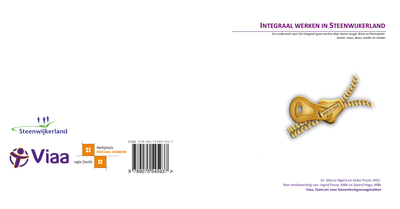Het project "werkplaats Oud-Oost" is opgezet om verkokering tussen organisaties te verkleinen, versnippering van aanpak en projecten te voorkomen en kennis die in het werkveld wordt ontwikkeld vast te houden. Het project beoogt daarmee een bijdrage te leveren aan ontschotting, professionalisering en de ontwikkeling van een gedeelde visie voor de aanpak van het gebied Oud-Oost. In dit plan van aanpak wordt de opzet van deze werkplaats verder uitgewerkt
DOCUMENT

For students who want support to continue their education.
DOCUMENT
In de afgelopen jaren is veel kennis opgebouwd en zijn instrumenten ontwikkeld rond het beter ondersteunen van gezinnen met een migratieachtergrond, of andere ouders en jeugdigen die soms ver afstaan van vormen van opvoedondersteuning. Deze gereedschapskist biedt een overzicht van dit soort kennis en instrumenten en verwijzingen naar waar deze te vinden zijn. Het aanbod is ontwikkeld in vier Academische Werkplaatsen, gefinancierd door ZonMw.
DOCUMENT

Professionals in zorg en welzijn hebben te maken met nieuwe vraagstukken rond de zorg en ondersteuning van mensen met ernstige psychische, sociale en lichamelijke beperkingen (RMO, 2001a). Aan de ene kant gaat het om basale ondersteuning in de woonsituatie, aan de andere kant betreft het de bevordering van participatie van deze burgers in de samenleving. Zorg en welzijn kunnen niet langer gescheiden van elkaar aangeboden worden. Het vereist een nieuwe geïntegreerde individuele én wijkgerichte aanpak. Deze aanpak vraagt om professionals die zowel kunnen werken aan de kant van individuele ondersteuning als aan de kant van sociale samenhang en maatschappelijke participatie.
DOCUMENT

Dit artikel dient als ondersteuning of voor verdere oriëntatie bij dit hoofdstuk in het boek ‘Ondernemen in Welzijn´ (uitgeverij Eburon)
LINK
Steenwijkerland heeft zich voorgenomen om haar inwoners met hun hulpvragen meer centraal te stellen. Dit wil zij onder andere bereiken door de teams met als specialisatie Jeugd, Wmo of Participatie integraal te laten werken met elkaar, voor zover de hulpvraag van de inwoner daartoe aanleiding geeft. Omdat de teams Jeugd en Wmo al eerder geïntegreerd waren, wilde men van die ervaringen leren. Het Centrum voor Samenlevingsvraagstukken (Werkplaats Sociaal Domein regio Zwolle) van hogeschool Viaa is gevraagd dit proces met onderzoek te begeleiden. De hoofdvraag van het onderzoek luidt: “Welke werkzame elementen van integraal werken in de gemeente Steenwijkerland kunnen doorontwikkeld worden?”
DOCUMENT

Hoofdstuk 1 in Schakels in de buurt. Professionals in zorg en welzijn hebben te maken met nieuwe vraagstukken rond de zorg en ondersteuning van mensen met ernstige psychische, sociale en lichamelijke beperkingen (RMO, 2001a). Aan de ene kant gaat het om basale ondersteuning in de woonsituatie, aan de andere kant betreft het de bevordering van participatie van deze burgers in de samenleving. Zorg en welzijn kunnen niet langer gescheiden van elkaar aangeboden worden. Het vereist een nieuwe geïntegreerde individuele én wijkgerichte aanpak. Deze aanpak vraagt om professionals die zowel kunnen werken aan de kant van individuele ondersteuning als aan de kant van sociale samenhang en maatschappelijke participatie.
DOCUMENT

Verpleegkundigen (i.o.) ervaren emotionele belasting door de werkzaamheden tijdens de eerste golf van de COVID-19 uitbraak. Verpleegkundigen (i.o.) ervaren peer support binnen hun eigen team of vanuit de opleiding als positief tijdens hun werkzaamheden in de COVID-19 uitbraak. Het toepassen van de drie- vragen-methode kan bijdragen aan het effectief omgaan met de emotionele belasting tijdens en na de COVID-19-uitbraak. De drie-vragen-methode kan informeel en structureel worden toegepast binnen het onderwijs door docenten en verpleegkundigen i.o., bijvoorbeeld tijdens bijeenkomsten voor intervisie, werkbegeleiding of studieloopbaanbegeleiding. De drie-vragen-methode kan informeel en structureel worden toegepast in de zorgpraktijk door leidinggevenden en collega's, bijvoorbeeld tijdens de koffie- of lunch- pauze, overdrachtsmomenten of dag- evaluaties.
LINK
De quickscan ‘Bouwen aan een thuis’ die in opdracht van de U161 is uitgevoerd door het Kenniscentrum Sociale Innovatie (KSI) van Hogeschool Utrecht (HU) in samenwerking met Movisie. Doel van deze quickscan was om bij een aantal projecten geleerde lessen op te halen ter ondersteuning van de ontwikkeling waarbij mensen uit beschermd wonen en maatschappelijke opvangvoorzieningen doorstromen naar een eigen huis in de wijk.
DOCUMENT

De kwaliteit van afstudeerproducten in het hbo moet omhoog. Bachelor - studenten hebben structurelere ondersteuning nodig bij het doen van literatuuronderzoek. Integratie van bibliotheektrainingen in de leerlijn Professional Skills moet ervoor zorgen dat de onderzoeksvaardigheden van ICT-studenten verbeteren
DOCUMENT
